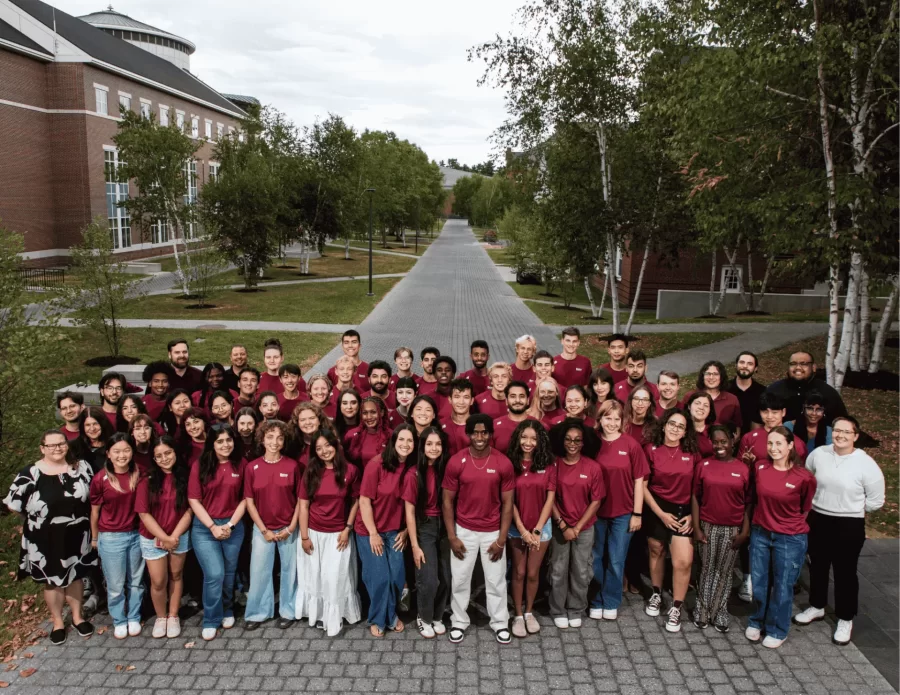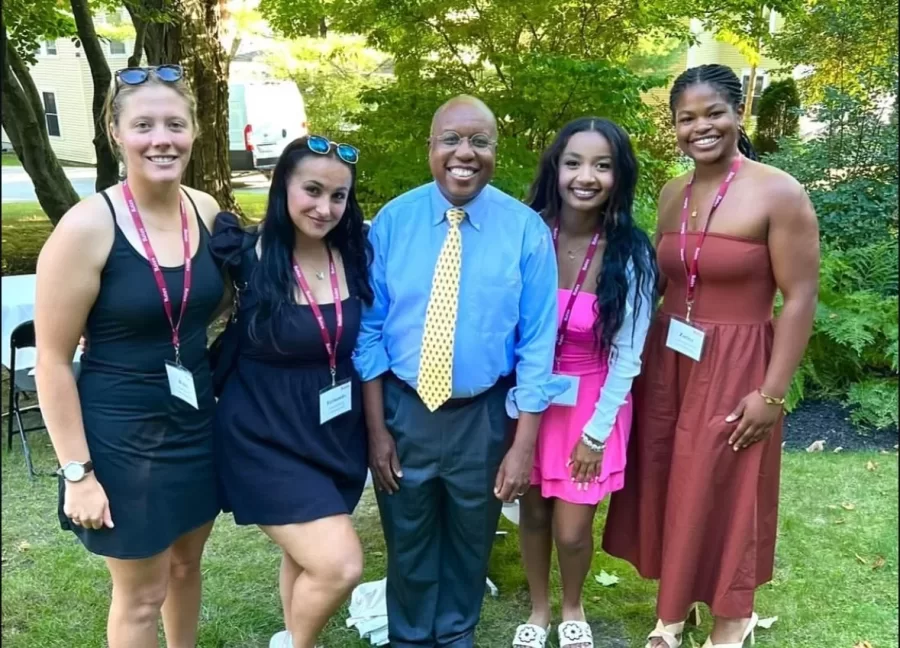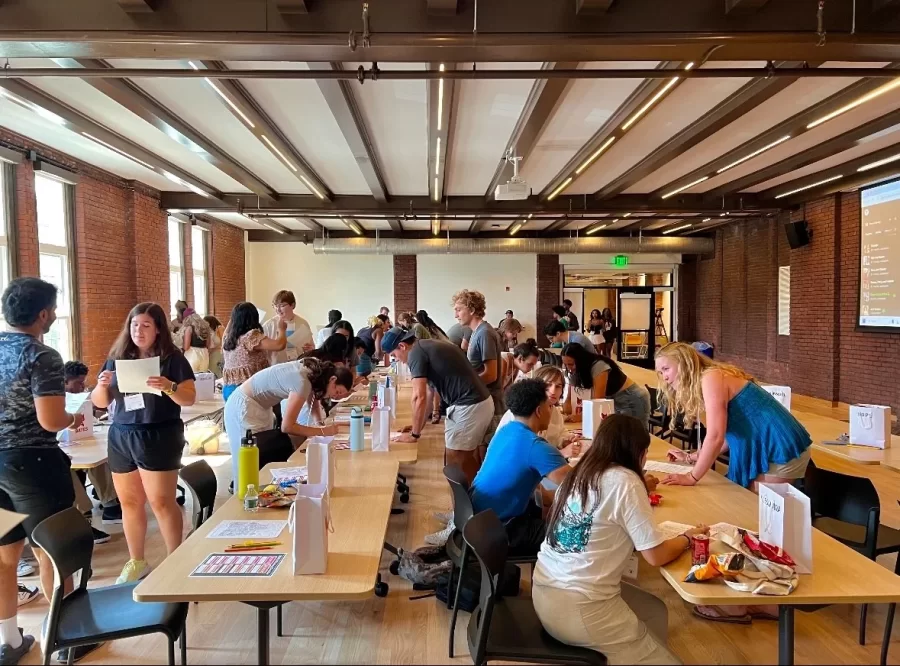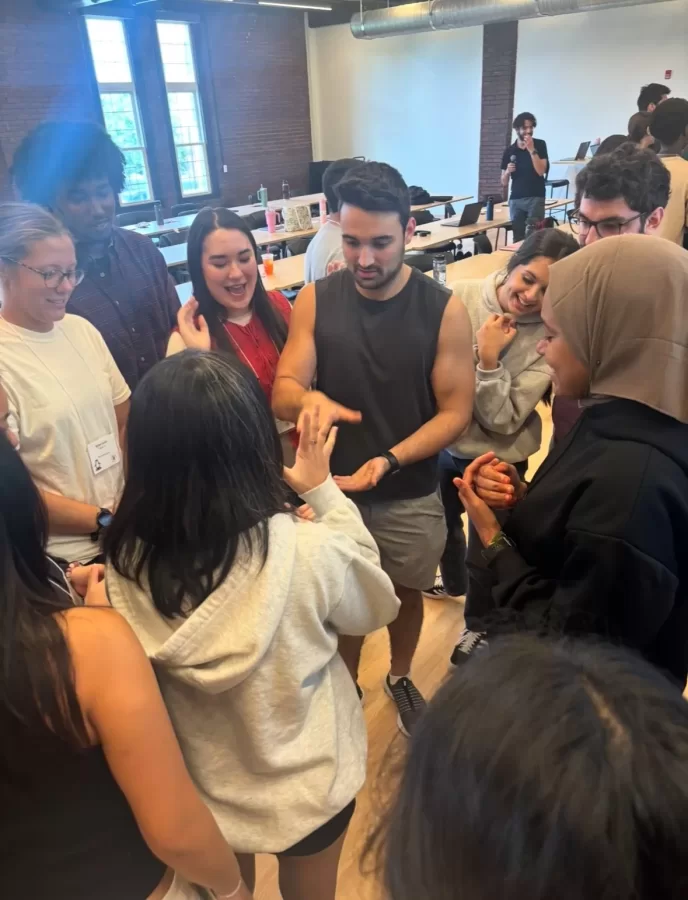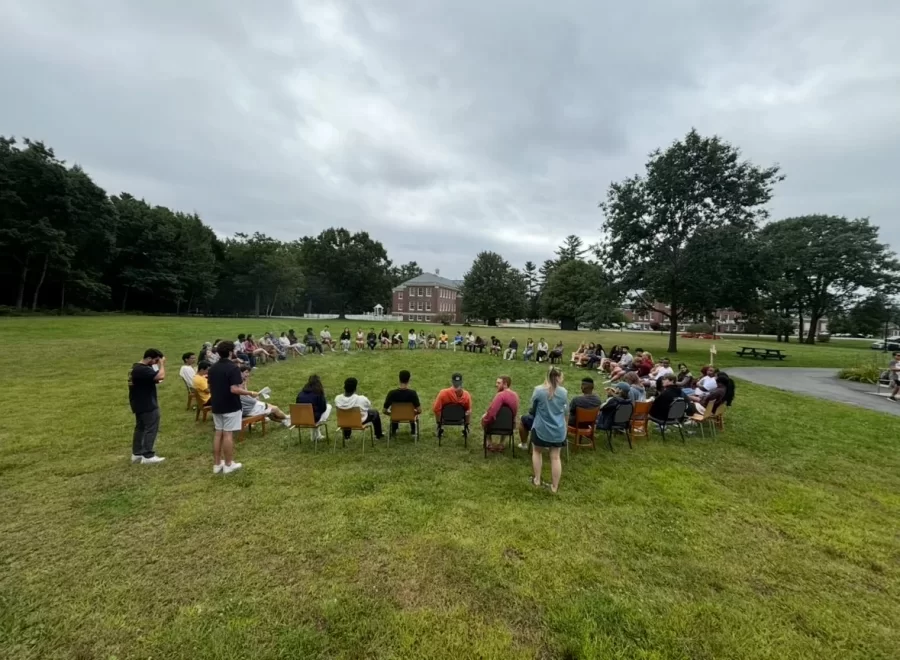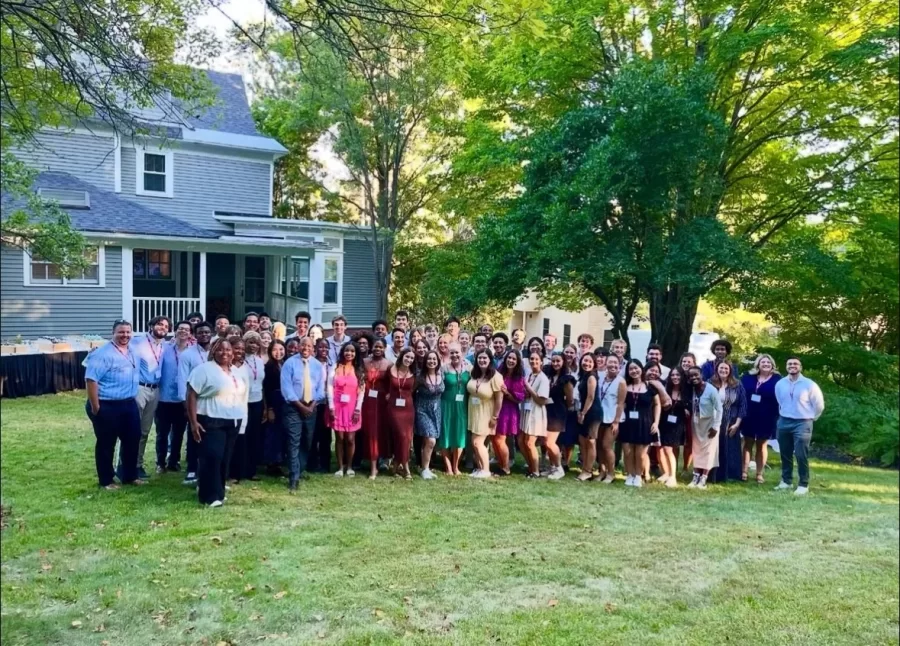Residence Life
The primary goal of Residence Life is to foster and sustain inclusive and accessible residential communities where all students can have meaningful relationships, develop skills for collegiate and life-long success, and engage in the essential work of self discovery. With support and mentorship from our Residence Life Student Staff, we aim to empower students to explore the intersection of identity and experience and to engage in meaningful dialogue around community norms and values.
Bates ResLife Student Staff members work to support student residents as peer advisors, advocates, and mediators. Every on-campus residential space has a designated Junior Advisor or Community Advisor who, with the support of a diverse professional team, is responsible for empowering residents to solve problems, mediating issues that need additional support, and for elevating ongoing or acute challenges to the appropriate department.
Navigation: Student Leader Roles | Application Timeline | Frequently Asked Questions
Student Leader Roles
The Residence Life Student Staff is made up of several key roles throughout the year. For the academic year, the primary positions include Junior Advisors, Community Advisors, Team Leaders, and one (1) Transfer Community Advisor (TCA). During the summer, we also employ 1-2 Summer Community Advisors (Summer CAs).
At their core, these roles share many responsibilities: each student staff member lives in a designated residential area with the students they support and serves as a resource and community builder. Please review the position descriptions below to learn more about the distinctions between each role.
Junior Advisor
Junior Advisors (JAs) live in a First-Year Center (FYC) and support only first-year students. There are multiple JAs in every building where first-year students reside. JAs foster intentional relationships with their first-year cohort, averaging between 10 and 25 residents. The primary goals of the JA are to help ease a first-year student’s transition to communal living, adapt to more rigorous academic requirements, and find balance among experiences that are competing for time.
+Duties and Responsibilities (Abridged)
- First-Year Community Support
- Live in and support a First-Year Center of 10–18 students by building inclusive, socially just residential communities; fostering belonging and campus connections; promoting wellness and campus resources; and supporting their transition through orientation, mentorship, and ongoing engagement.
- Well-Being Support
- Through training and collaboration with Bates Well-Being staff, develop a strong understanding of identity-informed wellness practices, assess community needs, and educate peers about campus health resources and how to access them.
- Programming & Engagement
- Facilitate residential programs and other engagement opportunities
- Peer Intervention & Support
- Approach residential concerns with empathy and humility, manage conflicts through inclusive dialogue, uphold community standards through educational conversations, and collaborate with Residence Life staff to support residents and address issues that impact the well-being of the community.
- Programming & Engagement
- Design and lead inclusive, engaging programs that foster connection and belonging within the First-Year Center, while collaborating with Residence Life staff, managing a budget, completing planning and evaluation tasks, and building strong relationships through regular one-on-one check-ins with residents.
- Personal & Professional Development
- Engage fully in training, supervision, and reflection by attending all required meetings and workshops, completing reflection forms, participating in regular check-ins, and upholding professional standards as a student leader and representative of the College.
- Collaboration
- Build collaborative, respectful relationships with campus departments to address residential needs and support First-Year Orientation through active participation in sessions, meals, and community events.
+Commitments
- Complete Monthly Reflection Forms by deadlines
- Attend all pre-term staff trainings (August and January)
- Participate in monthly Residence Life All-Staff Meetings (first Monday, 7:00–8:30 PM)
- Attend at least one JEDI-focused training or event per academic year
- Facilitate four community programs per semester and complete all related documentation
- Conduct one building walkthrough weekly to check signage and engage with residents
- Attend at least one ResLife Building Block Workshop per semester
- Participate in Mid-Year and End-of-Year reflection sessions with Area Coordinator
- Meet regularly with Area Coordinator for support and mentorship
- Attend bi-weekly Area Meetings with Team Leader and Area Coordinator
+Prerequisites
- Must be a rising sophomore, rising junior, or rising senior
- Must maintain good academic standing throughout the term of service
- Must be in good standing with the Office of Community Standards
- No prior residential or work experience required
Community Advisor
Community Advisors (CAs) live in houses and halls with a population of mixed class years and support upperclass year students. There is one CA per mixed class year building, with some CAs overseeing multiple houses. CAs do a great deal of community advising, peer mentoring, and resource referral through more informal relationships with their residents.
+Duties and Responsibilities (Abridged)
- Upper Division Community Support
- Support a residential community of 50–100 upper-division students by fostering inclusive, socially just environments, serving as a peer mentor and role model, and facilitating open conversations around community norms. Connect with residents before the term begins to prepare welcoming spaces, promote belonging and equity, encourage involvement in leadership and co-curricular opportunities, and actively engage in campus and residential initiatives to support their academic, social, and personal growth..
- Well-Being Support
- Through training and collaboration with Bates Well-Being staff, develop a strong understanding of identity-informed wellness practices, assess community needs, and educate peers about campus health resources and how to access them.
- Peer Intervention & Support
- Approach residential concerns with humility and empathy, managing conflicts through inclusive mediation that ensures all voices are heard. Collaborate with Residence Life staff to address ongoing issues, issue educational policy warnings, refer serious matters to appropriate offices, and work together to resolve community disruptions.
- Programming & Engagement
- Community Advisors plan and facilitate inclusive, engaging programs each semester to build community and strengthen resident relationships. They complete all program documentation, collaborate with Residence Life staff, manage a programming budget with Area Coordinator guidance, and connect regularly with residents through informal one-on-one check-ins.
- Personal & Professional Development
- Engage fully in training, supervision, and reflection by attending all required meetings and workshops, completing reflection forms, participating in regular check-ins, and upholding professional standards as a student leader and representative of the College.
- Collaboration
- Build collaborative, respectful relationships with campus departments to address residential needs and support First-Year Orientation through active participation in sessions, meals, and community events.
+Commitments
- Complete Monthly Reflection Forms by deadlines
- Attend all pre-term staff trainings (August and January)
- Participate in monthly Residence Life All-Staff Meetings (first Monday, 7:00–8:30 PM)
- Attend at least one JEDI-focused training or event per academic year
- Facilitate four community programs per semester and complete all related documentation
- Conduct one building walkthrough weekly to check signage and engage with residents
- Attend at least one ResLife Building Block Workshop per semester
- Participate in Mid-Year and End-of-Year reflection sessions with Area Coordinator
- Meet regularly with Area Coordinator for support and mentorship
- Attend bi-weekly Area Meetings with Team Leader and Area Coordinator
+Prerequisites
- Must be a rising sophomore, rising junior, or rising senior
- Must maintain good academic standing throughout the term of service
- Must be in good standing with the Office of Community Standards
- No prior residential or work experience required
Transfer Community Advisor (TCA)
The Transfer Community Advisor (TCA) lives in the same building as the designated Transfer Community or Transfer Center (location may vary year to year) and supports a small cohort of incoming transfer students, typically ranging from 5–15 residents.
In addition to general Community Advisor responsibilities, the TCA serves as a key resource for transfer student transition, fostering a sense of belonging and community. The TCA is expected to provide tailored support, help connect residents to campus resources, and develop community through intentional programming that addresses the unique experiences and needs of transfer students.
*The Transfer Community Advisor has the same position description as the Community Advisor*
Team Leader
Team Leaders (TLs) mentor and support a small team of Junior Advisors or Community Advisors while also serving as a Community Advisor for their own house or hall. Each team has one TL, with Junior Advisor teams organized by building and Community Advisor teams grouped by building type (houses or halls). TLs foster a professional community where staff collaborate, problem-solve, share resources, and find support through the challenges and successes of their work.
+Duties and Responsibilities (Abridged)
- Team Leadership
- Lead collaboration by building programming partnerships, driving information sharing, and proactively addressing challenges in weekly team meetings. Champion team growth through timely feedback, recognition, and inclusive engagement, while strengthening professional relationships through regular coaching with the Area Coordinator. Take an active role in staff development by leading pre-term training sessions and co-facilitating bi-weekly team meetings.
- Upper Division Community Support
- Support a residential community of 50–100 upper-division students by fostering inclusive, socially just environments, serving as a peer mentor and role model, and facilitating open conversations around community norms. Connect with residents before the term begins to prepare welcoming spaces, promote belonging and equity, encourage involvement in leadership and co-curricular opportunities, and actively engage in campus and residential initiatives to support their academic, social, and personal growth..
- Well-Being Support
- Through training and collaboration with Bates Well-Being staff, develop a strong understanding of identity-informed wellness practices, assess community needs, and educate peers about campus health resources and how to access them.
- Peer Intervention & Support
- Model a thoughtful and empathetic approach to residential concerns by embracing diverse perspectives and learning from experiences. Support peers in inclusive conflict management and mediation, collaborate with professional staff to address ongoing issues, and guide consistent, educational enforcement of community policies. Facilitate appropriate referrals to campus resources and work alongside staff to resolve community disruptions that affect the residential environment.
- Programming & Engagement
- Plan and facilitate inclusive community programs each semester that foster connection, strengthen relationships, and create a welcoming environment. Ensure strong administrative practices by completing all required documentation, collaborate with Residence Life staff to develop meaningful content, manage programming resources with the Area Coordinator, and engage regularly with residents through informal one-on-one check-ins.
- Personal & Professional Development
- Commit to ongoing development by attending all mandatory trainings and monthly staff meetings, co-facilitating bi-weekly team meetings, and participating in skill-building and equity-focused workshops. Complete required reflections and engage in regular supervision with the Area Coordinator, while maintaining professionalism and healthy boundaries as a representative of the College.
- Collaboration
- Foster collaborative relationships with campus departments to address residential concerns and mentor student staff in effective engagement with these partners. Lead and support peers during First-Year Orientation by actively participating in sessions, guiding resident engagement, and promoting inclusive, welcoming experiences.
+Commitments
- Complete Monthly Reflection Forms by deadlines
- Attend all pre-term staff trainings (August and January)
- Participate in monthly Residence Life All-Staff Meetings (first Monday, 7:00–8:30 PM)
- Attend at least one JEDI-focused training or event per academic year
- Facilitate four community programs per semester and complete all related documentation
- Conduct one building walkthrough weekly to check signage and engage with residents
- Attend at least one ResLife Building Block Workshop per semester
- Participate in Mid-Year and End-of-Year reflection sessions with Area Coordinator
- Meet regularly with Area Coordinator for support and mentorship
- Attend bi-weekly Area Meetings with Team Leader and Area Coordinator
- Identify and support skill-building opportunities for JAs/CAs through training, workshops, and programming
- Provide regular check-ins and coaching to address challenges, celebrate successes, and model best practices
- Lead team discussions to facilitate peer learning, resource sharing, and collaborative problem-solving
- Model inclusive, equitable leadership in conflict resolution, resident support, and community engagement
+Prerequisites
- Minimum of one year of experience on the Residence Life Staff as a Junior Advisor or Community Advisor
- Must be a rising junior or senior
- Must maintain good academic standing throughout the term of service
- Must be in good standing with the Office of Community Standards
Summer Community Advisor
*The four roles above are employed by our office throughout the academic year. We do not retain any student staff for Short Term, but we hire 1-2 Summer Community Advisors to support our student body that remains on-campus through the summertime.*
Summer Community Advisors (CAs) live in residential buildings open for student housing through the summer. The primary functions of a Summer CA are to foster a respectful community that support student well-being during a lower stakes time of year in addition to program planning, helping summer residents navigate and balance their responsibilities, and supporting Residence Life with various projects.
+Duties and Responsibilities (Abridged)
- Support a residential community of approximately 150 students, helping to establish and maintain healthy community norms and shared values
- Maintain an inclusive residential environment by facilitating honest conversations around community norms and expectations
- Live within the designated summer residential community(s) and spend meaningful time in common spaces when available to do so
- Support Residence Life by promoting evidence-based, identity-informed, health and wellness practices and concepts
- Manage potential conflict with an inclusive and empathetic approach
- Facilitate residential programs and other engagement opportunities
- With guidance from the supervising Area Coordinator, identify and schedule 5 hours per week to work in the Office of Residence Life and assist with summer projects and initiatives
+Commitments
- Submit employment forms in a timely manner
- Facilitate four (4) programs over the course of the summer term: two (2) in June, one (1) in July, and one (1) in August
- Complete all necessary Program Proposal Forms and funding forms associated with intended programs, via Bates Engage
- Conduct one (1) building walk-through per week to assess the environment and submit any necessary Work Orders
- With guidance from the supervising Area Coordinator, identify and schedule 5 hours per week to work in the Office of Residence Life and assist with summer projects and initiatives
- Meet with the Area Coordinator once per week for 30 minutes to tend to building issues/concerns, gain support for program planning, and check in about ongoing projects
- Complete (1) Summer Reflection Form in August
+Prerequisites
- Must be a rising junior, rising senior, or current senior who has previously been on the ResLife Staff
- Must maintain good academic standing throughout the term of service
- Must be in good standing with the Office of Community Standards
Hiring Process Timeline
The dates below outline the hiring timeline for the 2026–2027 academic year.
| Event | Date & Time | Location |
| ResLife Info Session #1 | November 10, 4:30 PM | Commons 221/222 |
| ResLife Tabling #1 | November 11, 12-2 PM | Commons Fireplace Lounge |
| ResLife Nomination Form Opens | November 18, 9 AM | Bates Engage |
| ResLife Info Session #2 | November 19, 1 PM | Commons 221/222 |
| ResLife Application Opens | December 1, 9 AM | Bates Engage |
| ResLife Info Session #3 | December 2, 12 PM | Commons 226 |
| ResLife Info Session #4 | December 3, 12 PM | Zoom |
| ResLife Nomination Form Closes | December 12 | Bates Engage |
| ResLife Tabling #2 | January 20, 1-2 PM | Commons Fireplace Lounge |
| ResLife Application Closes | January 23 | Bates Engage |
| ResLife Interviews | February 2 – February 11 | Google Meet |
Additional Hiring Process Information
Learn more about the application process, interview expectations, and commonly asked questions to help you prepare and navigate the hiring experience with confidence.
Application Process Guidance
Step 1 – Learn about the roles: Read the position descriptions carefully. Talk with your Junior Advisor or Community Advisor. Consider attending an info session (see dates above) to learn more before applying.
Step 2 – Engage in self-reflection: Identify the aspects of Residence Life work that interest you, the intersection of values, and the impact you hope to have.
Step 3 – Identify your 2 (two) references: Ask 1 (one) Bates community member to serve as a reference. This can be a current or former member of the student Residence Life Staff or a professional faculty or staff member. Identify 1 (one) additional reference. Your second reference can be provided by a member of the Bates community or from another position you’ve held outside of Bates. The important thing is to make sure they know they’re your reference and be sure to get their preferred email addresses.
Step 4 – Edit your cover letter and resume: The application requires a simple resume and cover letter. We recommend that applicants check out the Center for Purposeful Work’s online resources or schedule a meeting to get a professional eye on their application materials.
Step 5 – Complete the application: Be sure to complete and submit the Bates Engage Application by the deadline. NOTE: You will need to upload your cover letter and resume and provide the names and contact information for references as part of the application process.
Step 6 – Schedule your interview: After the application deadline, we will carefully review all applications and reach out to let you know whether you have been selected to schedule an interview or will not be advancing in the process.
Interview Details
Dates: Interviews for the 2026-2027 hiring process will be held between Monday, February 2nd and Wednesday, February 11th.
Location: Interviews will be conducted via Google Meet to ensure accessibility for all students, allowing everyone to fully participate in the process.
Length: Each interview will last approximately 30 minutes.
Interviewers: Interviews will be facilitated by a committee made up of professionals in the Office of Residence Life (Area Coordinators, Associate Director, etc.) and current Residence Life Student Staff members.
Structure: Committees will ask 5-7 questions, depending on time, and will leave a few minutes at the end of the interview for applicants to ask questions of their own. Interview question themes are provided to candidates ahead of their scheduled interview.
Frequently Asked Questions
Who is eligible to apply?
Current Bates College students who will be rising sophomores, juniors, or seniors are eligible to apply. You must also meet academic and conduct standards as outlined in the position qualifications.
When can I apply?
Applications typically open in early-December and remain open until mid to end of January. Specific dates can be found above or on various marketing materials around campus.
How do I apply?
Applications are submitted online through Bates Engage.
What kind of training is required?
All selected student staff are required to attend mandatory pre-term training sessions in August and January, ongoing in-semester trainings, and regular meetings throughout the year. If you anticipate any conflicts with these commitments, please carefully consider whether this role is the right fit for you.
Are there opportunities for professional development?
Yes, Residence Life staff engage in workshops, leadership training, and ongoing mentorship to build skills and enhance their experience.
Can I apply for multiple Residence Life positions?
Sort of! Typically, applicants should apply for the position that best fits their interests and qualifications. If unsure, you can contact the Residence Life office for guidance.
Is this a paid position?
Yes, all three positions are paid a stipend for the duration of the academic year following the Bi-Weekly Staff/Student Payroll Calendar. To learn more about compensation, please reach out to us directly at housing@bates.edu.
Who can I contact with questions?
Please reach out to the Residence Life office via email or stop by the office during business hours for assistance.
